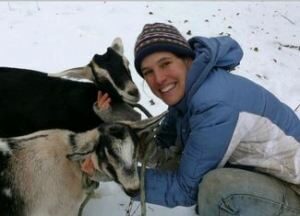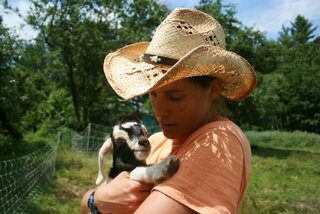By Cam Conway, Bindika Ghimire, Molly Mulchahy, Brendan Thurber, Colby-Sawyer College students (December 21, 2014)

Evandale Farm, located at 424 Tilton Hill Road in Pittsfield, New Hampshire, is a great example of what a permaculture farm truly stands for. Owners Ray Connor and her husband, Peter Dow, along with interns who live on the farm, do all the necessary things to be successful. They believe in growing food humanely, using organic practices, and employing the principles of permaculture. Their major objectives are to create systems that are ecologically sound and economically viable, provide for their needs, do not exploit or pollute, and are sustainable in the long term. At Evandale Farm, use of inherent qualities of plants and animals, combined with the natural characteristics of landscapes and structures, produce a life-supporting system.
One of the unique characteristics of permaculture gardening at Evandale is that it aims to imitate nature. The most noticeable difference is the lack of bare soil. Conservation of soil and water is a high priority, resulting in a more complex use of space. Plants are allowed to set seed and are inter-planted for pest control; they are not planted in rows. The permaculture system aims to harvest and maximize water, sun, and other natural energies – wind, dust, leaves, bird droppings—and minimize energy input. The farm takes responsibility for its waste; it aims not to pollute the surrounding environment.
Two big things that Ray and Peter strive for when farming are sustainability and “people power.” Ray said, “To us, sustainability means creating what you need and want locally, while minimizing outside inputs and waste.” Ray and Peter do an excellent job of creating a sustainable environment not only for themselves, but for the community.. Ray emphasized that people power—physical bodies on the farm and customers at the market—makes Evandale Farm flourish. Currently, eight people live with them on a rotating basis. Ray and her husband want to build a team so when they decide to move on they can trust others will successfully take over the farm.
The farm is currently 40 acres, but only three to five acres are used per year, rotating every three to four years. Their property is a mix of hemlock and white pine forest, mixed hardwoods forest, marsh, pasture, and orchard on pretty solid hardpan. They are reclaiming old pasture and hayfields, as well as apple trees of varying ages throughout the property, most specifically in the back pasture where a small orchard was planted decades ago and has sat untended for almost as long. They harvest firewood and are doing some preliminary milling experiments.
Evandale uses a high-tunnel for season extension and is developing annual, perennial, and herb gardens, some of them with the help of “livestock engineers.” Old, worn out areas are being resurrected by the work and energy of pigs, chickens, and goats, as well as humans. They planted over seventy-five edible trees and shrubs, including cultivated varieties of grape, pear, plum, sweet cherry, blueberry, mulberry, and peaches; and native varieties of Juneberry, elderberry, beach plum, Virginia rose, hazelnut, and bayberry. The farm has an outhouse and uses the waste as compost.
They sell pasture and forest-raised pork and goat meat, assorted seasonal vegetables, and certified organic whole chickens. All of their animals are raised on organic feed and forage and live on open pasture or in the woods. Their fruits and vegetables never see synthetic pesticides or fertilizers, as they opt to build healthy soil communities to support plant health and vigor. They market most of their produce in farmers markets, through a small Permaculture CSA called “Fair Share Permaculture,” and directly from the farm.
The authors are students at Colby-Sawyer College, New London, NH

Evandale Farm
Ray Conner and Peter Dow
424 Tilton Hill Road
Pittsfield, NH
Tel: 772-341-1850
By Helen Brody (December 9, 2012)

Evandale Farm’s Ray Conner and Peter Dow are part of the growing small-scale, regenerative farming movement in New Hampshire and New England; part of a growing sect of first generation farmers who are rediscovering the challenges and rewards of running a small farm and business.
Already, this young couple has had many diverse life experiences. Pete majored in mathematics and physics, and Ray in adventure based education and creative writing at New College of Florida, in Sarasota. They spent their first seven years together on a 45-foot Bruce Robert’s design steel sailboat, traveling, studying, and picking up odd jobs—including farm labor—as they made landfall along the way.
After a couple years at Longacre Farm in Newport, PA where community living and sustainable farming are intertwined, the urge to have firm footing on terra firma won out over the nautical life, and in 2010, they purchased 40 acres of land in Pittsfield, NH. Approximately 18 of the 40 acres are currently being converted into agricultural production.
While Ray focuses on the production of organically-raised meats and produce, Pete is focused on generating on-farm energy in order to create closed-loop systems on their farm.
“If there has been one overarching theme in my life, I suppose it has been a hunger for self-sufficiency” says Pete. Recycling the farm’s wasted energy has become one of his and Ray’s passions.
The farm depends on solar power for heat and electricity, wood for heat, and is exploring ethanol and methane production with the hopes of producing enough biofuel in the future to meet all of the farm’s energy needs.
They are proponents of permaculture, where a major tenet is to derive more than one product or function from every component of the farm’s systems. They are very excited about exploring the conversion of 15 acres of dense woodland into a silvopasture where they can produce timber, nuts and fruits, pastured meats, and mushrooms simultaneously, in a system that provides forage, fodder, shade and shelter for their animals.
“This system of farming, where you ‘stack’ multiple functions in one space takes more effort to establish than does a single crop farm,” says Ray, “but once established, requires less care and produces a more diverse—and potentially more profitable—yield.”
While all these plans incubate and hatch, the couple is working to fix and beautify their 1850s farmhouse to welcome friends and future farm partners, and are doing so according to a permaculture design first drawn up in 2011, the details of which shift and change as they uncover new quirks and discover new innovative ideas.
In addition to farming, Ray is pursuing a growing interest in agriculture policy work. She participated in the 2012 New England Farmer’s Union “fly-in” to Washington D.C., representing the growing constituency of small-scale, beginner farmers in our region who are seeking to be considered by Congress as they draft the new Farm Bill.
“It was important for myself and other small-scale New England producers to attend the fly-in,” she says “because much of what our representatives in Congress hear about agriculture concerns larger mid-west style operations.”
She currently chairs the New England Farmers’ Union Policy Committee, and is learning a lot about how decisions made on the ground are effected by those made from afar.
She works close to 40 hours each week off the farm. “I have two off-farm jobs,” says Ray, “one at Northeast Organic Farming Association of NH (NOFA-NH), and the other as a youth mentor with the Appalachian Mountain Teen Project (AMTP ). Peter works ad hoc with a machine shop in town, and with a company that installs solar energy systems.
In addition to a small vegetable crop, Ray and Pete sell pigs by the whole and half share, which are sent to local abattoirs for processing. They also sell various cuts of pork off the farm, which they have processed at Westminster Meats, a USDA certified slaughterhouse in VT. They raise Kosher King chickens, a heritage breed of roasters and broilers, which they sell frozen off the farm. Two dairy goats, a flock of laying hens, two mutts and two wily felines complete their current farmyard.
A high-tunnel, funded by National Resources Conservation Service (NRCS) is the newest addition to the farm.
Ray hopes to establish a three to four farm mini-distribution system in the near future. “I think it’s important to develop a variety of market opportunities for small-scale farmers, like us. Diversifying your markets is as important as diversifying your production in terms of mitigating risk. Both lead to a more resilient farm enterprise,” says Ray.
Clearly, the small-scale, organic, and regenerative farming movement is beginning to establish a firm foothold on Evandale Farm with these beginning farmers.
Evandale Farm
Pete Dow & Ray Conner
424 Tilton Hill Road
Pittsfield, NH 03263
(772) 341-1850
Retail: (Direct to customer sales) From the farm
Home Drop off Points: Concord, Wolfeboro, Laconia, Alton
